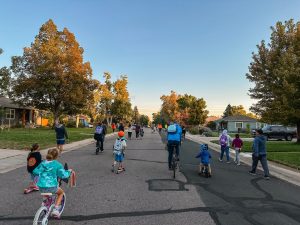2025 All-America City Finalist – Englewood, Colorado
Englewood, Colorado, a vibrant and diverse city of 35,000 on Denver’s southern border, is known for its youthful population, eclectic mix of businesses along Broadway, and strong healthcare sector, anchored by Swedish Medical Center and Craig Hospital. The city offers over 217 acres of parks and open space, including a water park, golf course, and two recreation centers. Despite its many strengths, Englewood faces significant environmental challenges common to the region, including extreme weather, air quality issues, and disproportionately high environmental health risks in certain census blocks, as identified by Colorado’s EnviroScreen. Recognizing these challenges, Englewood has made sustainability a central focus. Since 2020, the city has prioritized sustainability in its strategic plan, launched a dedicated sustainability program and commission, and hired a coordinator to lead initiatives. These efforts target climate impacts, energy efficiency, and waste diversion, especially to benefit the city’s most vulnerable populations. Englewood’s work demonstrates a commitment to inclusive progress, regional resilience, and environmental sustainability.
Removing Barriers, Sustainability for All
Engaging historically underserved and low-income residents in sustainability efforts is often limited by financial and accessibility barriers. Englewood recognized these challenges and committed to making sustainability initiatives more inclusive and equitable.
 The city worked closely with residents and community stakeholders to understand these barriers and design solutions. For example, in developing the Electric Vehicle (EV) Action Plan, city staff partnered with local nonprofits and hosted focus groups and tabling events to ensure diverse input shaped the plan’s priorities. Similarly, during Climate Resiliency Workshops, the city conducted targeted outreach using environmental health data and made participation accessible by providing childcare, translation, food, and a third-party facilitator to foster open dialogue.
The city worked closely with residents and community stakeholders to understand these barriers and design solutions. For example, in developing the Electric Vehicle (EV) Action Plan, city staff partnered with local nonprofits and hosted focus groups and tabling events to ensure diverse input shaped the plan’s priorities. Similarly, during Climate Resiliency Workshops, the city conducted targeted outreach using environmental health data and made participation accessible by providing childcare, translation, food, and a third-party facilitator to foster open dialogue.
To reduce financial barriers, Englewood launched the Sustainability Grant and Energy Efficient Englewood (E3) programs, providing direct funding for grassroots projects and energy-efficient home upgrades. Other programs such as turf replacement rebates, composting initiatives, and the At Your Door hazardous waste pickup service removed cost and transportation burdens.
These efforts not only empowered residents but also created systemic change. Insights from engagement activities informed a blueprint for low-income energy outreach and will guide future planning, including the 2026–2030 strategic plan. Englewood’s work demonstrates how inclusive design and sustained investment can create lasting environmental and community impact.
Rooted in Partnership: Englewood’s Collaborative Climate Action
Addressing environmental sustainability requires collaboration that extends beyond local government action alone. Englewood recognized that lasting progress depends on empowering residents, businesses, and partner organizations to lead and co-create solutions.

To define shared sustainability goals, Englewood actively partnered with community members and regional stakeholders. Residents proposed and implemented projects through the city’s Sustainability Grant Program, including “Little Green Libraries” with educational materials and a puzzle swap in partnership with a homelessness nonprofit. The transformation of Depot Prairie Park from turf to native habitat stemmed from a resident-led initiative, supported by city departments and community advocacy.
Englewood’s actions included hosting Earth Month programs featuring educational events with nonprofits, universities, and local experts. Regional partnerships strengthened efforts, such as an intergovernmental agreement with the City of Sheridan to share a sustainability manager, and the Tri-Cities Sustainable Business Partnership, which supports businesses in adopting green practices. The city also collaborated with South Platte Renew on cleanup efforts and energy efficiency campaigns.
These collaborations are expanding sustainability’s reach, from engaging woman-owned businesses to improving infrastructure through an energy performance contract. Regional studies, like a joint waste analysis, position Englewood and its neighbors to make data-informed decisions that benefit 194,000 residents. This interconnected, community-driven approach ensures long-term environmental impact across the region.
Clean and Connected Transportation
Like many communities, Englewood faces the challenge of limited clean and connected transportation options. Reliance on single-occupancy vehicles remains high, while public transportation—though available—is infrequent, expensive, and fragmented. To improve mobility and reduce environmental impact, Englewood is transforming its transportation landscape through community-driven planning and innovation.
 The city prioritized public engagement in reimagining local transportation. Through a citywide survey and a full rebrand of the free Englewood Trolley service, residents shaped updates designed to boost ridership. The resident-led Englewood Transportation Advisory Committee regularly collaborates with city departments to resolve traffic and safety issues. Similarly, community input helped shape the updated Walk and Wheel Plan, which has already added 4.6 miles of new bike lanes. A major infrastructure project—redeveloping Old Hampden Avenue—is also community-informed, with a stakeholder group representing diverse voices including residents with disabilities.
The city prioritized public engagement in reimagining local transportation. Through a citywide survey and a full rebrand of the free Englewood Trolley service, residents shaped updates designed to boost ridership. The resident-led Englewood Transportation Advisory Committee regularly collaborates with city departments to resolve traffic and safety issues. Similarly, community input helped shape the updated Walk and Wheel Plan, which has already added 4.6 miles of new bike lanes. A major infrastructure project—redeveloping Old Hampden Avenue—is also community-informed, with a stakeholder group representing diverse voices including residents with disabilities.
Beyond planning, Englewood uplifts multi-modal transportation through events and partnerships. Annual Bike to Work and School Days engage residents of all ages, while the Sustainable Business Partnership’s “Watts @ Work” event educates local businesses on EV options. Internally, the city launched the EngleRIDE program, providing incentives for employees to commute sustainably.
Englewood’s approach blends infrastructure investments with community ownership. As new projects like the Old Hampden complete streets initiative advance, the city continues to prioritize equity, access, and environmental sustainability through inclusive transportation solutions.
Some Related Posts
Thank You to Our Key Partners



